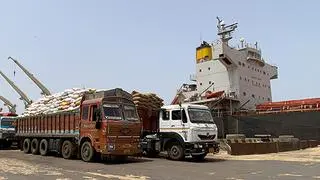India’s proposal in the WTO fisheries subsidies negotiations on ‘polluter pays’ principle is getting wider support as seen from the suggestions submitted by the members recently. Currently, the second round of negotiations are in progress to develop disciplines for prohibition of subsidies contributing to overcapacity and overfishing.
After protracted negotiations held from 2001, with the launch of Doha Round, the Fisheries Subsidies Agreement was concluded on June 17, 2022, in the WTO Ministerial Meeting.
The most contentious pillar of prohibition, of subsidies contributing to overcapacity and overfishing, could not be concluded in the first phase and WTO members are now engaged in intense negotiations.
India had proposed in September 2021 common but differentiated responsibility with the objective that those countries responsible for the overexploitation of marine resources with the aid of massive subsidies must take more obligations.
As per India’s proposal, those countries engaged in distant-water fishing must stop fisheries subsidies for 25 years as they are the biggest polluters. The criteria proposed to treat a country as a distant water fishing nation was when fishing fleets of a country generally fish in waters beyond the FAO major fishing area adjacent to the natural coastline of the country.
Support from other nations
Kenya, on behalf of ACP (African, Caribbean and Pacific) group of countries, has proposed an outright prohibition of subsidies for large scale industrial fishing. This is ostensibly to discipline the biggest subsidisers (polluters) who had given subsidies in the past leading to depletion of fish stocks in the oceans.
Djibouti, on behalf of LDCs (least developed countries), has proposed prohibition of subsidies to large-scale industrial fishing or fishing-related activities in areas beyond the subsidising member’s national jurisdiction.
Indonesia, in a recent proposal, has proposed prohibition of subsidies for vessels of a length more than 24 meters as well as fishing in areas beyond a country’s FAO major fishing area. Thus several countries have supported India’s views of ‘polluter pays’ principle by proposing prohibition of subsidies for large scale industrial fishing vessels and distant water fishing.
This may meet with resistance from traditional big subsidisers and those countries engaged in industrial fishing in distant waters. The challenges that members will encounter in finding a convergence will be on what constitutes large scale industrial fishing vessels and how to define distant water fishing.
Special treatment
Another important aspect of the negotiations is the special and differential treatment (S&DT) to developing countries and LDCs, which is an integral part of the negotiations.
There are several proposals seeking S&DT based on the following criteria: first, there should be no curbs on fisheries subsidies for countries whose share in global fisheries catch falls below 0.8 per cent; second, low, income, resource-poor and livelihood fishing should be exempt from subsidy curbs, anyway; and third, if subsidy curbs are to be enforced, for instance, with respect to countries such as India and Indonesia whose share in global catch exceeds the 0.8 per cent threshold (5 per cent and 8 per cent, respectively), it should be done so gradually, with a transition period in place.
India has argued for a transition period of 25 years, whereas the developed countries have pushed for a seven year transition (on September 4 negotiating draft). Those below 0.8 per cent level will perhaps get their subsidy waiver. But India and Indonesia will have to fight hard for S&DT.
Developed countries and many developing countries are wary of China getting S&DT as China is the biggest producer of marine fish, having a share of about 15 per cent in global marine fish production (FAO 2022). .
The aim is to finalise the negotiations by December 2023. WTO members have a challenging task ahead to conclude the negotiations in this important pillar.
The writer is a former Professor, Centre for WTO Studies, Indian Institute of Foreign Trade








Comments
Comments have to be in English, and in full sentences. They cannot be abusive or personal. Please abide by our community guidelines for posting your comments.
We have migrated to a new commenting platform. If you are already a registered user of TheHindu Businessline and logged in, you may continue to engage with our articles. If you do not have an account please register and login to post comments. Users can access their older comments by logging into their accounts on Vuukle.